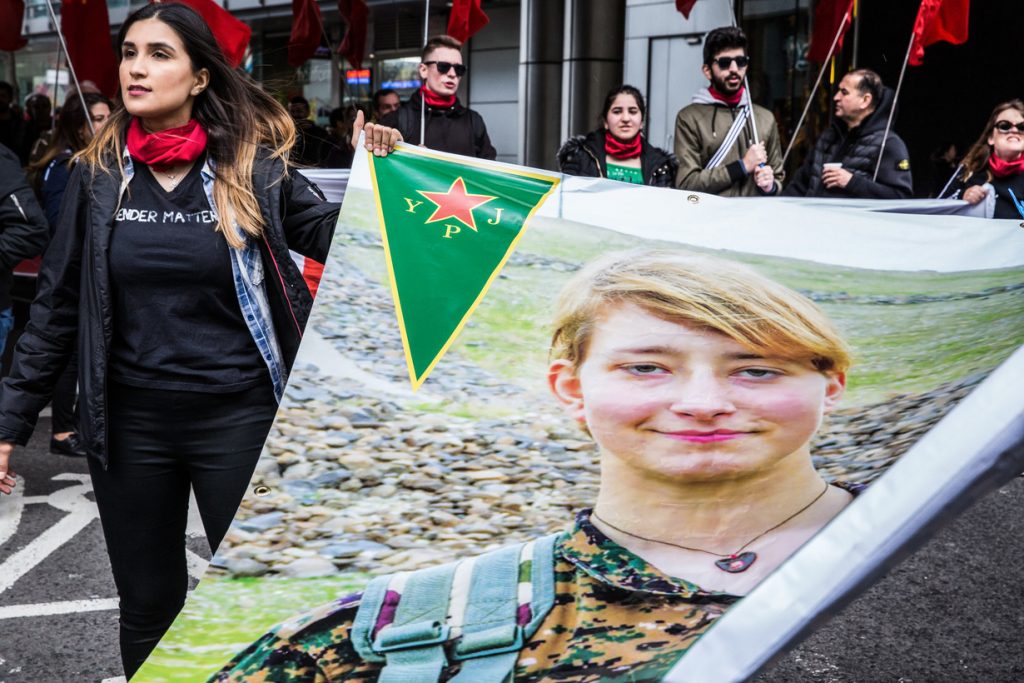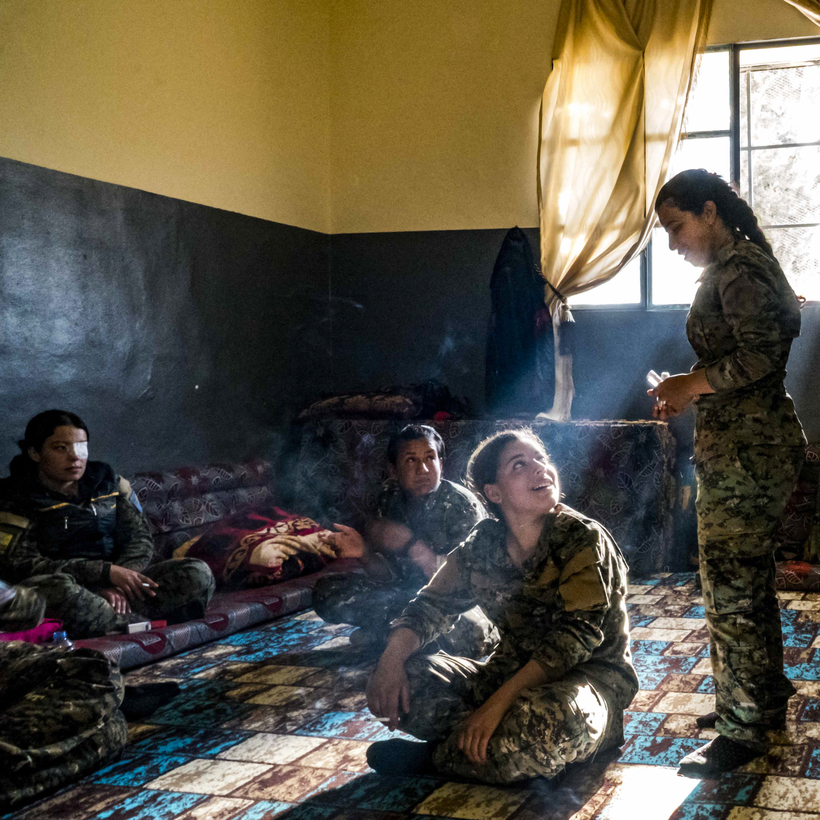Why are young British women volunteering to fight and die alongside the Kurds?
Long before President Trump abandoned the Kurds in northeastern Syria earlier this autumn, leaving them vulnerable to a Turkish Army onslaught, some young British women like Tanja (her nom de guerre) had made their way to one of the most remote parts of the Middle East to fight and serve alongside Kurdish nationals.
In London, Tanja was a bike mechanic. Now the 30-year-old is a Kurdish-speaking medic who evacuates wounded civilians from the front lines, ferrying them to a hospital in Tal Tamr. Four years ago, ISIS invaded the town—a mix of Kurds and Assyrian Christians. Now it is in the path of the Turks.
Most days, Tanja doesn’t sleep much; she’s often exhausted. Her work is largely at night—the time when most people get injured—and she drives back and forth between villages on the front lines and the main hospital. Her base is 40 kilometers south of Sari Kani. It is not within the “safe zone” to which Erdogan has proposed returning Syrian refugees—essentially ethnically cleansing Kurdish villages to re-populate them with Arabs.
“The safe zone is actually a zone of terror,” she tells me. “The danger right now is the Turkish-backed jihadist gangs. Since [the Turks] entered the country, they’ve been seizing more land.”
As we speak, she says, militias backed by Turkish drones and artillery are advancing.
“Everything here,” she says, in a low voice, “is about Turkish warfare.”
Tanja lives in the hospital, her small bedroom next to the morgue. She tells me it can be “gruesome … knowing that when I go to sleep, dead people are being unloaded.” She eats when she can eat; rests when she can close her eyes. It’s a difficult life, but she says that, in general, “people are really nice.” She says there is a strong kinship among the volunteers, everyone pitching in on chores. “These people are war heroes,” she tells me. “When the world is swimming in blood, it’s hard to do relentless jobs like these.”
But despite all of this, Tanja told me, Kurdish civilian morale was high.
“It’s something everyone works towards,” she said. Last week in Tal Tamr, there was a demonstration. Everyone came out onto the streets. She described almost a party atmosphere. “Teenagers sitting in the back of a van blasting Kurdish music,” she says. “You never would have guessed these people are oppressed.” Part of the reason for their spirit, she says, is solidarity. The Kurds have been betrayed throughout history, and since at least World War I they have learned to defend themselves and to expect nothing from outsiders. “No friends but the mountains” is the most famous Kurdish epigram.
Tanja’s path to this rugged piece of land began with her friend, Anna Campbell. The 26-year-old from East Sussex, England, with a wide smile and a private education, saw herself as a feminist and an idealist, protesting against the Establishment and fighting racism, sexism, populism. Even as a small girl she showed her mother her dolls and described them as fighters.
In May 2017, Anna traveled secretly to Rojava, in the northeast of Syria, to join Kurdish fighters who were trying to carve out an independent statelet and fight the Islamic State. No one who knew her was surprised by her departure. Rojava was in the middle of a revolution, and Anna was a warrior. The same emotions that drew foreign volunteers like George Orwell to Catalonia to fight with the Republican Army during the Spanish Civil War inflamed Anna: passionate intensity and a desire for justice. What had happened to the Kurds throughout history, she decided, was unjust.
What Anna found in the war zone was feminism come to life. Fierce, independent women have always played a role in the struggle for Kurdish independence. Female Kurdish peshmerga guerrilla fighters (the meaning is “Those who face death”) have trained in their own units for decades but only recently started fighting in direct combat. Some of the best fighters I saw in Aleppo were female Kurdish units, and when the Islamic State invaded northern Iraq in 2014 and came close to Kurdish cities like Erbil, they began to train and organize even more.
In that part of the world, women are equal parts feminine and tough. I remember spending time training with a unit of Yazidi women in 2016 who had formed in the aftermath of their villages being overrun by ISIS. They rose at dawn, did weapons training, never parted from their guns, and were as dedicated as any male soldiers. But in the evenings they gathered as if they were in a boarding school, washing their waist-length hair and talking about boyfriends. At night we slept on the roof, their guns by their sides. It was inspiring to see women fighting for their own countries: refusing to be victims or passive, even in a traditionally macho environment.
In Kurdistan, Anna dyed her hair black, adopted a Kurdish name—Hêlîn Qereçox—and joined the Women’s Protection Unit of the Y.P.G. (the Kurdish People’s Protection Units). But the fight against the Islamic State was brutal, and despite brief military training, Anna was killed in March 2018, when she was traveling in a convoy that was hit by a Turkish missile.
Anna was one of eight British nationals killed fighting with the Y.P.G. Since then, her influence and her legacy have been vast. A poignant BBC film, Anna: The Woman Who Went to Fight ISIS, was aired. Her father, Dirk, a musician and activist who once got arrested at a sit-in, spoke out on the betrayal of the Kurds.
More importantly, Anna’s courage has inspired her British friends to go to Kurdistan and take up her fight. Friends like Tanja.

“After Anna died, a few friends came to Kurdistan to see what she had died for,” Tanja says slowly. Like Anna, Tanja traveled in secret and began language training. Unlike Anna, she chose not to take up arms. She felt being a medic could do just as much good. “Anna was so concrete and so clear about why she was here,” Tanja says. “She inspired people to fight capitalist modernity and to change this world for the better. I want this to carry on.”
There are times now when Tanja forgets she is in the middle of a war zone. Tal Tamr is a leafy town, and she says everyone knows everyone. Her Kurdish has become better. “You know your neighbors—everyone asks everyone how their day is.”
As for her family, she says her grandmother doesn’t know where she is. “She thinks I am in Palestine.” But her mother and aunt, who raised her, know she is in Kurdistan. She says her stoic mother is proud: “She would never tell me I am mad to come here,” Tanja insists. “They know that love is about letting people go.”
Tanja often thinks of her fallen friend, Anna. She wishes people could know more about her as a person. But she also wants to keep Anna’s struggle alive.
“I have a lot of memories of Anna being an amazing person outside of her work,” she says. “I feel so much pride in what she did … but I suppose overall, I want people to remember the revolution and the desire to keep fighting.”

